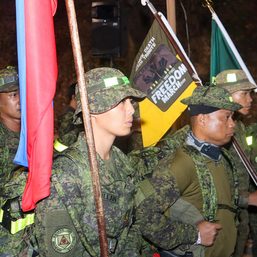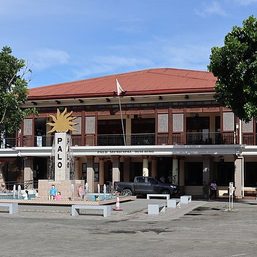SUMMARY
This is AI generated summarization, which may have errors. For context, always refer to the full article.
![[OPINION] PH history education: In defense of (and an appeal to) Secretary Briones](https://www.rappler.com/tachyon/2022/01/ispeak-history.jpg)
Last January 12, 2022, the official Facebook page of the Department of Education (DepEd) released a series of statements in response to a post of a certain Atty. Wilfredo Garrido. They even included this in a press conference that I saw on ABS-CBN.
Along with their response is a confluence of multiple issues that needs to be compartmentalized. As an educator and Philippine history advocate, I wish to address these issues.
On false information
Firstly, I would like to address the comments made presumably by this individual. I do not know who this Atty. Garrido is. But based on the partisan remarks he made public, his post is riddled with inaccuracies. He said, “Education Secretary Leonor Briones has removed a huge chunk of the latter from the school curriculum – Philippine History – in the elementary and high school levels, through Department of Education (DepEd) Order No. 20.”
He mentioned that Philippine history was removed from BOTH elementary and high school, when in fact cause-oriented and professional groups are promoting the return of a dedicated Philippine history subject in the Araling Panlipunan (AP) curriculum for the high school level only. Meaning, the advocacy is only for the secondary or high school level. There is still Philippine history in the elementary level under K-12. Philippine history is taught in the 5th and 6th grades of AP.
He also attributed the removal of Philippine history to Secretary Briones. Reality is, groups started advocating for the return of a dedicated Philippine history subject in high school Araling Panlipunan due to DepEd Order 20, 2014. This government order was signed by former DepEd secretary Armin Luistro, FSC. This happened in conjunction with the implementation of the K-12 curriculum. This means stakeholders and concerned citizens started the clarion call during the previous Aquino administration.
Regardless of the intentions of the Atty. Garrido post, I found it suspicious when he cited DepEd Order 20 without mentioning the year it was promulgated.
What made things more lamentable is the underhanded accusations against the secretary. He called her an “octogenarian, geriatric, anti-Filipino, unpatriotic” and a “cultural saboteur.”
Despite my strong disagreements with her and her department’s stance, I think those words are plain unfair and immature. As a professional teacher and Philippine history advocate, I draw my line on this one. I, alongside like-minded educators, refuse to downgrade myself to ageism or any type of problematic conversational tool to advance discourse on Philippine education. In defense of Secretary Briones, I believe those words are extremely unwarranted.
On Philippine history education
Secondly, let me respond to other aspects of the public statements of DepEd on Philippine history in basic education. I have a hunch that partisan DepEd bureaucrats exploited this opportunity to reaffirm their stance with a degree of moral high ground.
Setting aside the issues related to that Atty. Garrido post, I will focus on aspects of the statement that pertained to the advocacy of returning Philippine history to the high school level.
A portion of the statement reads: “The current AP curriculum covers various Philippine history topics across grade levels. These topics also serve as take-off points in all discussions relative to Asian Studies, World History, Economics, and Contemporary Issues in Junior High School and Understanding Culture, Society, and Politics, and Philippine Politics and Governance in Senior High School…. In addition, Philippine history competencies found in the curriculum are covered by textbooks and other learning resources distributed to learners.” This demonstrates Philippine history competencies are already “integrated” across these content areas.
For advocacy groups such as the one where I belong, we FIRMLY believe the so-called “integration of Philippine history competencies” in other areas is logistically impossible. Our membership consists of professional teachers, professionals, and college students who are K-12 graduates. Based on our grassroots experience and practice, we barely felt such integration. Much has been written on this already. This is why, from our perspective, Philippine history was EFFECTIVELY REMOVED from high school.
All other programs such as Balik Kasaysayan are, from my view, welcome but insufficient in addressing Philippine history concerns in high school.
As a high school teacher myself, I barely had the opportunity to “integrate” Philippine history back when I was teaching 7th grade Asian studies because of the a) lack of contact time, b) multiple disruptions in the school calendar, and c) incompatibility of certain Asian history topics with Philippine history. Nagmumukha lang na pilit kapag ginagawa ko ito. These are the same sentiments of multiple teachers I talked to in our movement.
That is why I take exception with another public statement where DepEd said, “Framing the integration of Philippine History in Araling Panlipunan as having removed content on Philippine history altogether is misleading and false.” So what we, teachers and K-12 graduates, experienced was FALSE? That portion of the statement is quite disagreeable. Reality on the ground is different.
The teaching profession is difficult. We, teachers and students, see what is on the ground. When a government agency insists otherwise, they are unfortunately INVALIDATING these actual experiences on the ground. If that is the case, then there is a significant disparity between those in the central office and those in the frontlines.
Long-term effects
Finally, let me address the potential consequences of this event. For sure, the discussion on this topic will be misdirected. And this partisan misdirection of discourse will ignore actual issues on the ground.
In late 2021, an interesting research article was published in the Philippine Social Sciences Journal (PSSJ). Entitled “Readings in Philippine History: Course Review, Best Practices, and Challenges among Higher Education Institutions,” the article was written by Alvin Alic and Joel Bual. In this research, indicators have shown that college students are having difficulty in Readings in Philippine History (RPH) classes due to the lack of prior knowledge. It is considered a “top challenge” for said course.
As a result, precious time is allotted to basic remedials for a college course intended for higher learning. This issue is attributed to the lack of a dedicated Philippine history course in high school.
I have also heard anecdotal reports from higher education professors corroborating this concern. This also relates to the susceptibility of the Filipino youth to fake news. With weak foundations in Philippine history, students can fall prey to online disinformation (including fake news on Philippine history). The PISA 2018’s index of knowledge of reading strategies for assessing the credibility of sources has shown that the Filipino youth is, indeed, susceptible to fake news. That is a great threat to our nation.
Fortunately, Congress is drafting a bill supporting our advocacy.
Reflections
With all that said, many conversations on social media about this issue have degenerated into unnecessary, partisan ad hominems that do not go anywhere. Coming from a non-partisan group, I can certainly say the initial gains we had on discussions were weakened because of this escapade.
Regrettably, the supposed statement of Atty. Garrido did more harm to our cause than good. The post itself is riddled with factual inaccuracies.
That is why I must publicly appeal to Secretary Leonor Briones: Set aside what was said to you by your curricularist minders in DepEd. Do not mind the political gadflies as well.
Please listen directly from the actual teachers, students, and advocacy groups pushing for the return of Philippine history as a dedicated course in high school Araling Panlipunan. Our movement, the High School Philippine History Movement (HSPHM), is willing to engage in dialogue. We sincerely hope to have mature, professional, and patriotic conversations with you.
Ultimately, the choice is yours, ma’am. – Rappler.com
Jamaico D. Ignacio is the convener of the High School Philippine History Movement or HSPHM (formerly known as Ibalik ang Philippine History sa High School Movement). He used to teach AP at the Malayan High School of Science and is currently working as an AP teacher at the Ateneo de Manila Junior High School. Official email of HSPHM: ibalik.phil.his.sa.hs@gmail.com.
Add a comment
How does this make you feel?
![[OPINION] On history, wasted time, and ‘Nadine Lustre’](https://www.rappler.com/tachyon/2022/01/imho-history-nadine-education-1.jpg?fit=449%2C449)
![[OPINION] On the lack of public historians and intellectual spaces](https://www.rappler.com/tachyon/2022/01/ispeak-lack-of-history-spaces.jpg?fit=449%2C449)





There are no comments yet. Add your comment to start the conversation.